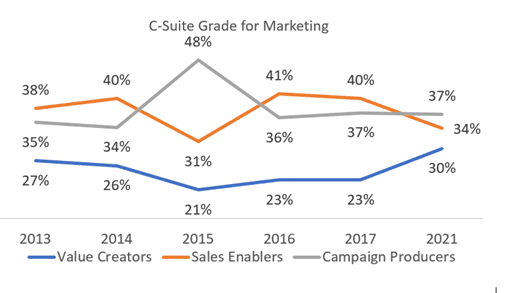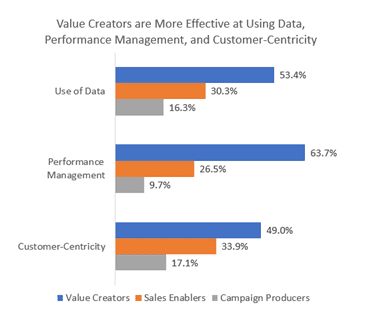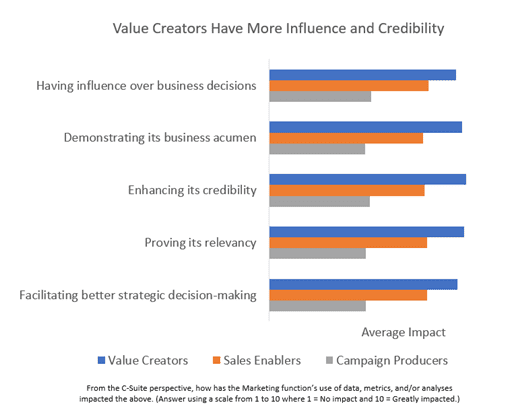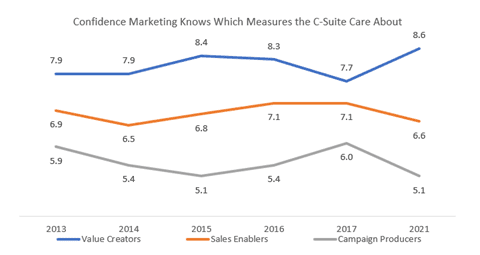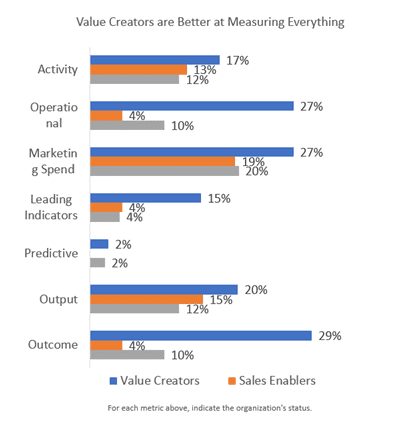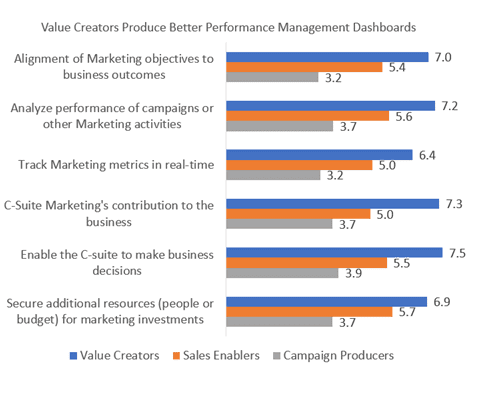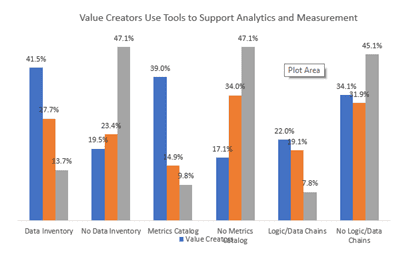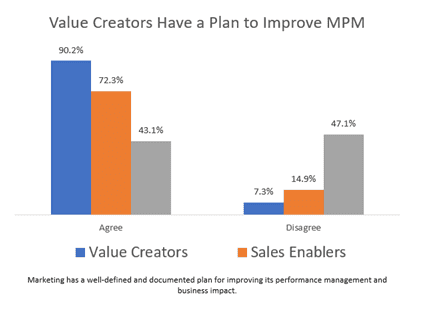How to Join the Ranks of Best-in-Class Marketing Organizations

By Laura Patterson, President of VisionEdge Marketing
“The increased pressure to deliver results is not likely to go away anytime soon”, says Darryl Sparey, Managing Director and Co-Founder of Hard Numbers. Does that sound like a lament from decades ago? Sadly no. It appeared just last year in the article that claimed marketers continue to remain under pressure to deliver results.
The journey to prove and communicate Marketing’s value has been underway ever since 19th century Philadelphia retailer John Wanamaker supposedly said, “Half the money I spend on advertising is wasted; the trouble is I don’t know which half.” Christine Moorman & Roland T. Rust published a seminal article in 1999 on the Role of Marketing which addressed the importance of accountability in Marketing. Their work, our work, and that of others helped spark the Marketing Performance Management (MPM) discipline. Marketing performance management has been one of the most prominent streams in recent marketing research and practice.
Almost 20 years later, a 2016 study by CMO Council and Deloitte The CMO Shift to Gaining Lift, found, “only one in four CMOs actually feels they are doing well specific to quantifying and communicating marketing’s impact on the business, with an elite 3% saying they are actually doing this extremely well. However, the majority of respondents (46% are getting better while 22% are working on it) are still on the path to accurate and valuable measures that actually tie marketing’s contribution to business growth.”
Here we are in the next decade of the 2000s. Armed with more technology, more data, and more analytics capabilities. How well are Marketing organizations able to measure and demonstrate their value? Well, there’s good news and then not so good news, at least according to the findings from our 2021-2022 Marketing Organization Value and Performance Management (MPM) Benchmark Study. This study is the continuation of a longitudinal study that began in 2001. The purpose of the study is to gain insights into what high performing Best-in-Class (BIC) Marketing organizations do better, and differently, from their counterparts to earn high marks from the C-suite.
While Marketing organizations are making headway, still only 1 in 3 earn high-marks from the C-suite for the ability to demonstrate their value, impact, and contribution to the business. Based on C-suite scoring over the years, we have identified three Marketing organization personas:
- Value Creators the BIC group of Marketing organizations, with a strategic focus on creating growth and value.
- Sales Enablers who see themselves in service the Sales team and primarily focus on lead generation.
- Campaign Producers who operate like an internal marketing agency creating and implementing brand and demand programs and associated tactics.
Source: Cultivating BIC Marketing Orgs:2021-22 MPM Report, The Jindal School and VEM.
After 20 years of research, we have a solid understanding of what the Value Creators, do better than their counterparts. There are three statistically significant characteristics of the Value Creators compared to the other personas:
- Use of Data
- Performance Management
- Customer-Centricity
Source: Cultivating BIC Marketing Orgs:2021-22 MPM Report, The Jindal School and VEM
When it comes to performance management, Value Creators are leaps and bounds ahead of their counterparts. Performance management requires an investment of time, people, and money. Is it worth the effort?
Based on our research, the answer is yes. The effort pays off. Value Creators yield better business results. They are therefore more likely to be perceived as relevant by the C-suite and achieve greater credibility. Their strengths in performance management, business acumen and credibility enable Value Creators to facilitate and have greater influence over strategic business decisions.
Source: Cultivating BIC Marketing Orgs:2021-22 MPM Report, The Jindal School and VEM.
For Marketing organizations aspiring greater credibility and influence, better performance management creates this opportunity. There are three performance management capabilities where Value Creators excel.
- A firm grasp on measures that matter
- More effective dashboards
- Deployment of 3 tools
Let’s take a quick look at each.
Value Creators Chose Mission-Meaningful Measures
The marketing industry is over-reliant on campaign delivery metrics, used in reporting on campaign outcomes – “rather than true measures of effectiveness relating to response, brand and business effects.” While of value, campaign outcomes are not the measures that matter most to the C-suite. One reason Value Creators earn the high marks – they know which measures and metrics matter.
BIC Marketing organizations understand how what their company sells and creates value for customers and for the company. They understand that how the company measures success is what enables people in any function to select measures that matter to the C-suite and set appropriate performance targets.
Combining their knowledge of which measures matter, employing them effectively, and being able to link their metrics to the business are primary capabilities of Value Creators.
Source: Cultivating BIC Marketing Orgs:2021-22 MPM Report, The Jindal School and VEM.
Value Creators outperform their counterparts in terms of measuring their contribution. A key reason Value Creators earn the higher grade from the C-suite is that Value Creators are 2.8X times better than Sales Enablers and 8.9X times better than Campaign Producers at measuring contribution to the business and making it clear how the Marketing function is impacting the business.
How do they do this? They connect their measures to business results. Value Creators are 4X more likely to earn a score of 8 or higher for their ability to link their measures to business outcomes than Campaign Producers, and nearly 2X more likely to do so, than Sales Enablers. Campaign Producers are over 2X more likely to score below an 8 on this capability.
In addition to being better at selecting the right measures, Value Creators are better at measurement. Value Creators outshine their colleagues in every measurement category: customer, market, and revenue, and across the opportunity lifecycle.
Source: Cultivating BIC Marketing Orgs:2021-22 MPM Report, The Jindal School and VEM.
Key Takeaway: While there is still plenty of room for improvement when it comes to measurement and metrics, Value Creators recognize that business outcomes, what the business wants to achieve and how success will be measured, are the starting point. Begin your plans with these as your guide for measures and performance target selection.
Value Creators Produce Strategic Decision Support Dashboards
Most Marketing organizations produce some type of dashboard. The performance dashboards of Value Creators are distinctive. Value Creators are far superior to their counterparts in producing and using performance management dashboards which communicate Marketing’s contribution and enable the C-suite to measure and analyze performance and make business decisions. The C-suite finds their dashboards more relevant. The leadership team uses these dashboards to make decisions.
Value Creators are better at using the dashboard to monitor and measure the objectives in terms of performance targets and impact on business results. Better metrics and better dashboards lead to being better able to manage and improve performance, make strategic recommendations, and secure more resources.
Key Takeaway: Dashboards are a critical component of MPM. Even though the Value Creators produce better dashboards, there is significant opportunity for all Marketing organizations to improve their development, and use of, performance management dashboards. Create a dashboard that demonstrates both Marketing alignment to the business as well as how Marketing is contributing to the business and attaining its performance targets in terms of results, time, and cost.
Source: Cultivating BIC Marketing Orgs:2021-22 MPM Report, The Jindal School and VEM.
Value Creators Invest in Three Performance Management Tools
The study has consistently revealed three tools that are essential to supporting performance management:
- Data inventory. Where is the data, who has access to it, how often is it updated, etc.
- Metrics catalogs. What are the measures, how are they calculated, where are they reported, etc.
- Data/logic chains. How well the measures from activity to outcome link together to connect Marketing efforts to business results.
Producing a data inventory is a strength among the Value Creators and a tool where they continue to invest. A data inventory captures and keeps track of the data Marketing needs and uses, the source of the data, where it is located, how frequently it is updated, who in the organization is responsible for the data, how the data is used, and who uses.
Key Takeaway: Acquiring data is no longer a challenge for most organization. The key challenge is deriving insights from the data. To be adept at using data to derive insights, you need to know your data and foster a data-to-insights culture. Organizations that reflect this culture are better positioned to leverage data to maximize its efforts and optimize Marketing investments.
Source: Cultivating BIC Marketing Orgs:2021-22 MPM Report, The Jindal School and VEM.
Want to Improve? Have a Plan.
Value Creators stand out from their counterparts in many areas. Even where they are considerably better, they, along with their counterparts, have plenty of room for improvement. And Value Creators know it. Value Creators are committed to improving their performance management capabilities; they have and implement a plan to improve. They are 2X more likely than their counterparts to have a plan for improving performance management and business impact and more committed to improving their MPM capabilities.
Source: Cultivating BIC Marketing Orgs:2021-22 MPM Report, The Jindal School and VEM.
Summary
Performance management emphasizes accountability, transparency, and target setting; areas where Value Creators excel compared to their counterparts. Accountability is about more than identifying and selecting the right measures. Performance management dashboards constructed with the right measures takes business acumen. When Marketing leaders develop and implement plans that positively impact the business, Marketing improves its relevancy and credibility. Relevancy and credibility enable marketers to expand the conversation with the leadership team that can result with marketers having more latitude over decisions and investments.
